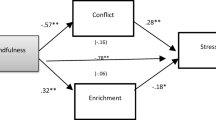Abstract
Gallup surveys consistently show that nine in 10 Americans express a belief in God (Nash, Business, religion, and spirituality: A new synthesis, 2003), while more than 45 % claim to have some awareness of God on the job (Nash and McLellan, Church on Sunday, Work on Monday: The Challenges of Fusing Christian Values with Business Life, 2001). Recently, Lynn et al. (Journal of Business Ethics 85:227–243, 2009) argued that the ability to integrate the specific beliefs and practices of one’s faith with the work one does represent an important although neglected area of research. As such, they developed and demonstrated convergent validity for the faith at work scale, designed to measure the extent to which individuals believe they are able to integrate their Judaeo-Christian beliefs and practices and their work. In a subsequent study, Lynn et al. (Human Relations 64:675–701, 2010) demonstrated that the faith at work scale was related to faith maturity, church attendance, age, and denominational strictness, and negatively associated with organizational size. No research, however, has examined the possible positive benefits of integrating faith and work. I therefore developed and tested hypotheses concerning the relationship between the faith at work scale and seven important life and work outcomes (satisfaction with life, intent to leave one’s job, self-rated job performance, job satisfaction, and three forms of organizational commitment). In all, four of seven hypotheses were confirmed.
Similar content being viewed by others
References
Allen, N. J., & Meyer, J. P. (1990). The measurement and antecedents of affective, continuance and normative commitment to the organization. Journal of Occupational Psychology, 63, 1–18.
Brayfield, A. H., & Rothe, H. F. (1951). An index of job satisfaction. Journal of Applied Psychology, 35, 307–311.
Conway, J. M., & Lance, C. E. (2010). What reviewers should expect from authors regarding common method bias in organizational research. Journal of Business Psychology, 25, 325–334.
Diener, E., Emmons, R. A., Larsen, R. J., & Griffin, S. (1985). The satisfaction with life scale. Journal of Personality Assessment, 49, 71–75.
Gosling, S. D., Vazire, S., Srivastava, S., & John, O. P. (2004). Should we trust web-based studies? A comparative analysis of six preconceptions about internet questionnaires. American Psychologist, 59(2), 93–104.
Janssen, O., & Van Yperen, N. O. (2004). Employees goal orientations, the quality of leader–member exchange and the outcomes of job performance and job satisfaction. Academy of Management Journal, 47, 368–384.
Judge, T. A., Bono, J. E., Erez, A., & Locke, E. A. (2005). Core self-evaluations and job and life satisfaction: The role of self-concordance and goal attainment. Journal of Applied Psychology, 90, 257–268.
Judge, T. A., Bono, J. E., & Locke, E. A. (2000). Personality and job satisfaction: The mediating role of job characteristics. Journal of Applied Psychology, 85, 237–249.
Judge, T. A., Erez, A., Bono, J. E., & Thoresen, C. J. (2003). The core self-evaluations scale (CSES): Development of a measure. Personnel Psychology, 56, 303–331.
Judge, T. A., Van Vianen, A. E. M., & De Pater, I. E. (2004). Emotional stability, core self- evaluations, and job outcomes: A review of the literature and an agenda for future research. Human Performance, 17, 325–346.
King, J. E. (2008). (Dis)Missing the obvious: Will mainstream management research ever take religion seriously? Journal of Management Inquiry, 17, 214–224.
Lance, C. E., Dawson, B., Birklebach, D., & Hoffman, B. J. (2010). Method effects, measurement error, and substantive conclusions. Organizational Research Methods, 13(3), 435–455.
Lynn, M. L., Naughton, M. J., & VanderVeen, S. (2009). Faith at work scale (FAW): Justification, development, and validation of a measure of Judaeo-Christian religion in the workplace. Journal of Business Ethics, 85, 227–243.
Lynn, M. L., Naughton, M. J., & VanderVeen, S. (2010). Connecting religion and work: Patterns and influences of work-faith integration. Human Relations, 64, 675–701.
Mobley, W. H., Horner, S. O., & Hollingsworth, A. T. (1978). An evaluation of precursors of hospital employee turnover. Journal of Applied Psychology, 63, 408–414.
Nash, L. L. (2003). A spiritual audit of business: From tipping point to tripping point. In O. F. Williams (Ed.), Business, religion and spirituality: A new synthesis. Notre Dame: Notre Dame Press.
Nash, L. L., & McLennan, S. (2001). Church on sunday, work on monday: The challenges of fusing christian values with business life. San Francisco: Jossey-Bass.
Noe, R. A., Hollenbeck, J. R., Gerhart, B., & Wright, P. M. (2008). Human resource management: gaining a competitive advantage (6th ed.). New York: McGraw Hill.
Pfeffer, J. (2003). Business and the spirit. In R. A. Giacalone & C. L. Jurkiewicz (Eds.), Handbook of workplace spirituality and organizational performance. Armonk: M.E. Sharpe, Inc.
Podsakoff, P. M., & Mackenzie, S. B. (1989). A second generation measure of organizational citizenship behavior, Working paper. Bloomington: Indiana University, Indiana.
Podsakoff, P. M., Mackenzie, S. B., Lee, J., & Podsakoff, N. P. (2003). Common method biases in behavior research: A critical review of the literature and recommended remedies. Journal of Applied Psychology, 88(5), 879–903.
Rossiter, J. R. (2002). The C-OAR-SE procedure for scale development in marketing. International Journal of Research in Marketing, 19, 305–335.
Weaver, G. R., & Agle, B. R. (2002). Religiosity and ethical behavior in organizations: A Symbolic interactionist perspective. Academy of Management Review, 27, 77–97.
Author information
Authors and Affiliations
Corresponding author
Rights and permissions
About this article
Cite this article
Walker, A.G. The Relationship between the Integration of Faith and Work with Life and Job Outcomes. J Bus Ethics 112, 453–461 (2013). https://doi.org/10.1007/s10551-012-1271-0
Received:
Accepted:
Published:
Issue Date:
DOI: https://doi.org/10.1007/s10551-012-1271-0




